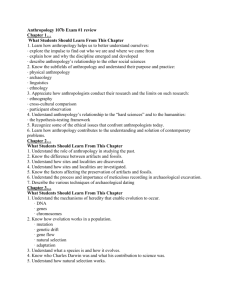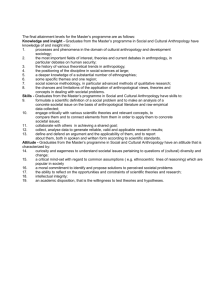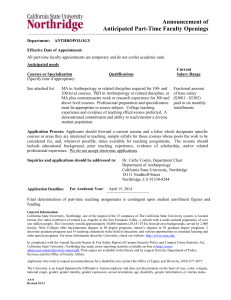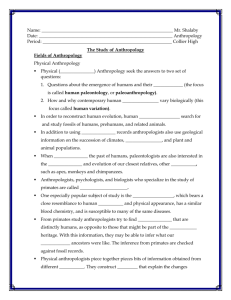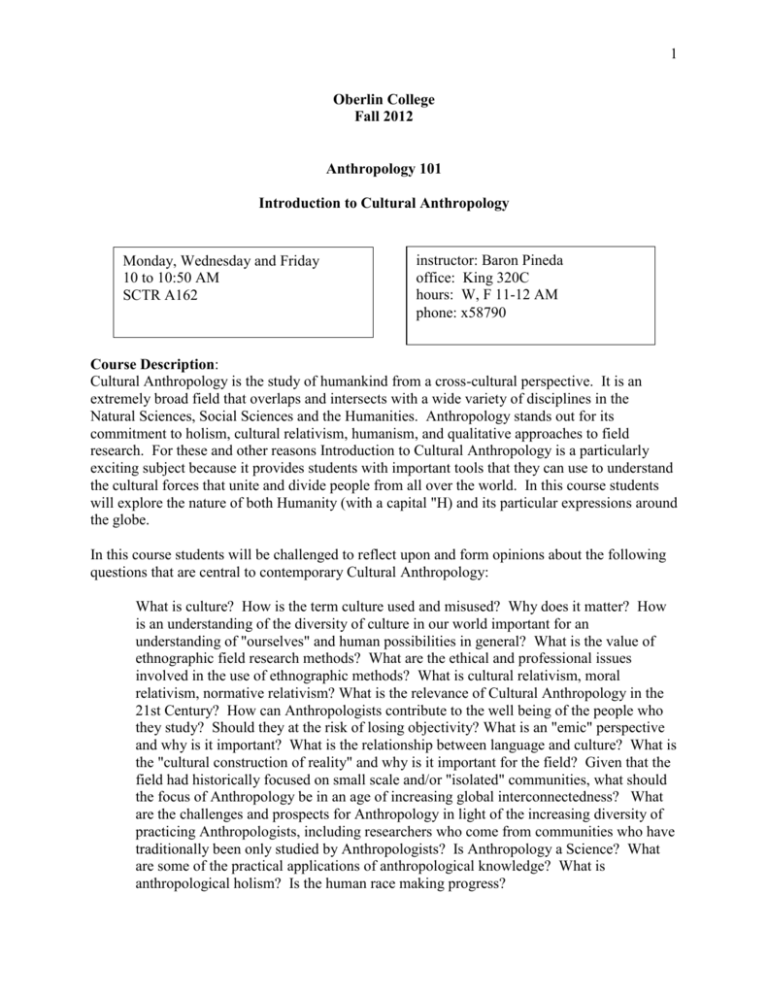
1
Oberlin College
Fall 2012
Anthropology 101
Introduction to Cultural Anthropology
Monday, Wednesday and Friday
10 to 10:50 AM
SCTR A162
instructor: Baron Pineda
office: King 320C
hours: W, F 11-12 AM
phone: x58790
Course Description:
Cultural Anthropology is the study of humankind from a cross-cultural perspective. It is an
extremely broad field that overlaps and intersects with a wide variety of disciplines in the
Natural Sciences, Social Sciences and the Humanities. Anthropology stands out for its
commitment to holism, cultural relativism, humanism, and qualitative approaches to field
research. For these and other reasons Introduction to Cultural Anthropology is a particularly
exciting subject because it provides students with important tools that they can use to understand
the cultural forces that unite and divide people from all over the world. In this course students
will explore the nature of both Humanity (with a capital "H) and its particular expressions around
the globe.
In this course students will be challenged to reflect upon and form opinions about the following
questions that are central to contemporary Cultural Anthropology:
What is culture? How is the term culture used and misused? Why does it matter? How
is an understanding of the diversity of culture in our world important for an
understanding of "ourselves" and human possibilities in general? What is the value of
ethnographic field research methods? What are the ethical and professional issues
involved in the use of ethnographic methods? What is cultural relativism, moral
relativism, normative relativism? What is the relevance of Cultural Anthropology in the
21st Century? How can Anthropologists contribute to the well being of the people who
they study? Should they at the risk of losing objectivity? What is an "emic" perspective
and why is it important? What is the relationship between language and culture? What is
the "cultural construction of reality" and why is it important for the field? Given that the
field had historically focused on small scale and/or "isolated" communities, what should
the focus of Anthropology be in an age of increasing global interconnectedness? What
are the challenges and prospects for Anthropology in light of the increasing diversity of
practicing Anthropologists, including researchers who come from communities who have
traditionally been only studied by Anthropologists? Is Anthropology a Science? What
are some of the practical applications of anthropological knowledge? What is
anthropological holism? Is the human race making progress?
2
Course Goals: After having taken this class students should 1) understand the major concerns,
controversies in the field of Cultural Anthropology today 2) be able to apply the tools of Cultural
Anthropology to their own lives and careers 3) increase their skill in using library and computer
resources for conducting research 4) acquire a rich and intimate understanding of a particular
"people of the world" based on a close reading of secondary and primary sources about/from this
group 5) become aware of the findings in Anthropology that are reported on in the popular
media.
Honor Code: At the end of each academic exercise students shall write in full the Honor
Pledge: "I affirm that I have adhered to the Honor Code in this assignment." It is assumed that
all students are familiar with the Oberlin College honor code and honor system. You can review
it at: http://new.oberlin.edu/students/policies/11-Policies-Honor.pdf
Assignments and Grading:
Students will be evaluated on the basis of: 1) class attendance/participation – 20% 2) final paper,
"peoples of the world" - 25% 3) anthropology in the news/journals assignments – 30% 4) pop
quizzes – 20% 5) final presentation - 5%
Grading of Writing Assignments: All writing assignments will be evaluated on the basis of 1)
clarity of argument and writing 2) effective use of sources 3) ability to make insightful
connections between the subject at hand and the major themes and questions of the class.
Attendance/Participation (20%):
Students are expected to come to class having read the selections for that day. Students are
expected to knowledgably participate in class discussions. Students who have more than two
unexcused absences will not be eligible for an "A" or "A-" grade in the class. Students who have
more than 4 unexcused absences will not be eligible for a "B+" or "B" grade. This rule applies
above and beyond the weight of absences in the overall attendance/participation grade. Students
are responsible for all assignments, instructions, lectures notes etc. that they miss during an
absence. Absences will only be excused when students have so requested/notified IN
ADVANCE of the class session in question. Students may communicate with the instructor
about missed classes by e-mail, phone message or in person.
Research Paper- "PEOPLES OF THE WORLD" (25%): Each student will choose to focus
on a group of people that is represented in the anthropological literature. Over the course of the
semester students will conduct research on this group. Students will write a research paper (10
pages in length) on the group/issue that they choose which addresses the following questions.
Due Dec. 20th. The topic paragraph and preliminary bibliography are due October 13th.
1) Who are they? Where do they live? How do they live? On what basis can they be
viewed as a single group of people?
2) What challenges and prospects do they face as a community? How are they changing
as a group?
3) Have Anthropologists studied them and something about their way of life? Why did
these Anthropologists choose to study them? What have their findings been?
4) What has been the relationship between this group and the Anthropologists that have
studied them?
3
5) In your presentation relate what you have learned about this group to one or more of
the central themes and questions (listed above) of the class.
Final Presentation: In the final two weeks of class students will give a presentation based on
their final project. This will be a multimedia presentation that will also be turned in and, when
appropriate, displayed in the Anthropology display case. (5%)
Independent Reading and Writing Assignments: Anthropology in the News and Journals
For the first twelve weeks of class students will find and read an article from a
magazine/newspaper or scholarly journal that is related to the topics of that week. Students will
post in Blackboard a 300 word response to the article that includes a citation. In this posting
students will be expected to briefly summarize the article and react to it in an anthropologicallyinformed way. Over the course of the semester students will post a response to journal articles
and magazine/newspaper articles depending on the instructions for that week. A good place to
look for newspaper/magazine articles is: http://anthropology.tamu.edu/news/ A good place to
look for articles from Anthropology journals is www.anthrosource.net . These assignments will
be graded. (30%)
Pop Quizzes (20%): Over the course of the semester students will be given a number of “pop
quizzes” in which they will be asked to write about issues related to reading assignments and
lectures.
Books:
1) James Spradley and David McCurdy. 2012. Conformity and Conflict: Readings in
Cultural Anthropology (14th edition), Pearson/Prentice Hall.
2) Robert L. Welsch and Kirk M. Endicott, Softcover, 2013, Taking Sides: Clashing Views
in Anthropology (5th Edition) ISBN-13 9780078050343, McGraw Hill.
Weekly Schedule
Week 1: The Four Fields of Anthropology
Wednesday (9/5)
no readings
Friday (9/7)
Ch. 31, Horace Miner, “Body Ritual Among the Nacirema”
Week 2: Culture and Ethnography
Monday (9/10)
Ch. 2, Richard Borshay Lee, “Eating Christmas in the Kalahari”; Ch. 3
Claire Sterk, “Fieldwork on Prostitution in the Era of AIDS”
Wednesday (9/12)
Ch. 1, James Spradley, “Ethnography and Culture”; Ch. 4, George
Gmelch, “Nice Girls Don’t Talk to Rastas”
Friday (9/14)
Issue 11, Taking Sides, “Should Cultural Anthropology Stop Trying to
Model Itself as a Science?”
4
Week 3: Language and Communication
Monday (9/17)
Ch. 6, Guy Deutscher, “Whorf Revisited: You are What You Speak”; Ch.
5, Laura Bohannan, “Shakespeare in the Bush”
Wednesday (9/19)
Ch. 7, Sarah Boxer, “Manipulating Meaning: The Military Name Game”;
Issue 9, Taking Sides, “Does Language Shape How We Think
Friday (9/21)
Ch. 8, Deborah Tannen, “Conversation Style: Talking on the Job”; Issue
10, Taking Sides, “Is Black American English a Separate Language from
Standard American English, with Its Own Distinctive Grammar and
Vocabulary?”
Week 4: Kinship, Sexuality and Family
Monday (9/24)
Ch. 17, Nancy Scheper-Hughes, “Mother’s Love: Death without
Weeping”; Ch. 18, David McCurdy, “Family and Kinship in Village
India”
Wednesday (9/26)
Ch. 19, Melvyn Goldstein, “Polyandry: When Brothers Take a Wife”;
Issue 3, Taking Sides, “Are Female Primates Selected to be
Monogamous?”
Friday (9/28)
Ch. 20, Margery Wolf, “Uterine Families and the Women’s Community”;
Issue 13, Taking Sides, “Do Men Dominate Women in All Societies?”
Week 5: Race, Ethnicity and Gender
Monday (10/1)
Ch. 24, Jefferson Fish, “Mixed Blood”; Issue 1, Taking Sides, “Is Race a
Useful Concept for Anthropologists?”
Wednesday (10/3)
Ch. 23, Lila Abu-Lughod, “Do Muslim Women Really Need Saving”;
Issue 15, Taking Sides, “Is Conflict Between Ethnic Groups Inevitable?”
Friday (10/5)
Ch. 14, Phillipe Bourgois, “Poverty at Work: Office Employment and the
Crack Alternative”;Ch. 22, Dianna Shandy and Karine Moe, “The Opt-Out
Phenomena: Work, Work and Identity in America?”;
Week 6: Ecology and Subsistence
Monday (10/8)
Ch. 9, Richard “The Hunters: Scarce Resources in the Kalahari”; Ch. 10,
Richard Nelson, “Eskimo Science”
Wednesday (10/10)
Ch. 11, Jared Diamond, “Domestication and the Evolution of Disease”;
Issue 5, Taking Sides, “Did Climate Change Rather than Overhunting
Cause the Extinction of Mammoths and Other Megafauna in North
America?
5
Friday (10/12)
Ch. 12, Richard Reed, “Forest Development the Indian Way”; Ch. 13,
Lee Cronk, “Reciprocity and the Power of Giving
Topic Paragraph and Preliminary Bibliography due Oct. 13th
Week 7: Economics and Development in Cross-Cultural Perspective
Monday (10/15)
Ch. 34, Dianna Shandy, “The Road to Refugee Resettlement”; Ch. 35,
“Global Women in the New Economy”, Barbara Ehrenreich and Arlie
Russell Hochschild;
Wednesday (10/17)
Ch. 15, “Cocaine and the Economic Deterioration of Bolivia,” Jack
Weatherford; Ch. 32, Theodore Bestor, “How Sushi Went Global”
Friday (10/19)
Ch. 16, Sonia Patten, “Malawi Versus the World Bank”; Ch. 36, Hoyt
Alverson, “Advice for Developers: Peace Corps Problems in Botswana”;
FALL RECESS: (10/20-10/28)
Week 8: Law and Politics
Monday (10/29)
Ch. 25, Anne Sutherland, “Cross-Cultural Law: The Case of the Gypsy
Offender; Ch. 28, Freed and Freed, “Taraka’s Ghost”
Wednesday (10/31)
Ch. 26, Marvin Harris, “Life Without Chiefs”
Friday (11/2)
Ch. 27, Jack Weatherford, “The Founding Indian Fathers”
Week 9: Anthropological Ethics
Monday (11/5)
Ch. 33, Arjun Guneratne and Kate Bjork, “Village Walks: Tourism and
Globalization among the Tharu of Nepal”; Issue 16, Taking Sides, “Do
Native Peoples Today Invent Their Traditions?”
Wednesday (11/7)
Issue 17, Taking Sides, “Should the Remains of Prehistoric Native
Americans be Reburied Rather Than Studied?
Friday (11/9)
Issue 18, Taking Sides, “Did Napoleon Chagnon’s Research Methods
Harm the Yanomami Indians of Venezuela?
Week 10: Applied Anthropology and Careers in Anthropology
Monday (11/12)
Ch. 38, Rachel Stryker, “Public Interest Ethnography: Women’s Prisons
and Health Care in California”
Wednesday (11/14)
Ch. 21, Brenda Mann, “You@Work: Jobs, Identity and the Internet”; Ch.
39, David McCurdy, “Using Anthropology”
6
Friday (11/16)
Ch. 40, John Omohundro, “Career Advice for Anthropology
Undergraduates”
Week 11: Medical Anthropology
Monday (11/19)
Ch. 37, Ron Barrett, “Medical Anthropology: Leprosy on the Ganges”
Wednesday (11/21)
Ch. 38 “Medical Anthropology: Improving Nutrition in Malawi,” Sonia
Patten
Thursday (11/22)
Friday (11/23)
Thanksgiving
No class meeting
Week 12: Religion, Magic and Ritual
Monday (11/26)
Ch. 29, George Gmelch, “Baseball Magic”
Wednesday (11/28)
Ch. 30, Jill Dubisch, “Run for the Wall: an American Pilgrimage”
Friday (11/30)
Issue 14, Taking Sides, “Does the Distinction Between the Natural and
the Supernatural Exist in All Cultures”
WEEK 13: In-class presentations
Monday (12/03)
Wednesday (12/05)
Friday (12/07)
WEEK 14: In-class presentations (continued)
Monday (12/10)
Wednesday (12/12)
Friday (12/14)
Final Paper due Thursday, December 20th, 4pm



